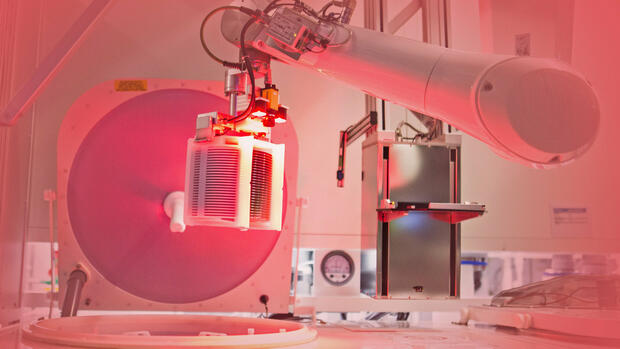Munich. State aid yes, but not on these terms: the planned billions of subsidies from the European Union (EU) are welcome in the chip industry. The associated interventions in business, on the other hand, are met with rejection. Behind closed doors, company representatives warn against “planned economy”.
Subsidies are available for investments in new, highly modern factories or in advanced production processes. The most well-known investor is Intel. The Americans are to receive almost seven billion euros for two factories in Magdeburg. To meet the obligations, Intel will not only produce on its own account, but also act as a contract manufacturer for competitors.
At the same time, the Commission wants to monitor the supply chain. This is intended to detect faults at an early stage in the future and prevent a chip shortage as in the past two years. Brussels also wants to intervene if the chips threaten to run out. In the future, the EU could instruct chip companies which components they have to produce in what quantities and in what period – and at what price.
For expert Kleinhans, this is nonsense. “The focus is on eliminating short-term supply bottlenecks. But this is impossible. Because the production takes far too long.“ It usually takes between four and six months to produce a semiconductor.
EU wants an X-ray of the chip industry
The plans are part of the Chips Act, which was presented by Commission President Ursula von der Leyen at the beginning of the year. The EU Parliament is currently discussing the law. The goal is to double Europe’s share of global chip production from less than 10 to 20 percent – by the end of the decade. At the same time, Europe should develop more chips and ensure the supply of domestic industry.
The EU plans to collect extensive data. This includes whether raw materials, chip machines and manpower are sufficiently available in the semiconductor industry. The bureaucrats want to determine the needs of customers broken down by chip type. The Community wants to record strong price fluctuations and assess the effects of natural disasters, customs duties or takeovers.
The individual states are to collect the information and forward it to a newly created European Semiconductor Board. It is under the authority of the Commission.
Kleinhans believes that this is based on the assumption that demand fluctuations and upcoming shortages can be predicted better than industry. However, it is hardly to be expected that the chip manufacturers will release sensitive data. They would have no guarantee that these would not fall into the hands of the competition.
The EU sees it differently. “We are not asking for confidential data,” says Thomas Skordas, Deputy Director of the Connect Directorate-General. Their boss, Commissioner Thierry Breton, pushed the Chips Act. Skordas: “Rather, we want to know if there are problems.” The electrical engineer warns: if the EU’s chip subsidies fail, the share of global production will “fall to four to five percent by 2030 – in the best case”.
Industry rejects export controls
On the other hand, Kleinhans believes that it is unrealistic for the EU to predict demand more reliably than companies or market researchers. That’s not all. There are many thousands of different chip types. A component that was developed for one industry cannot easily use another, according to a statement by the Federal Association of German Industry (BDI) on the Chips Act.
“In addition, chip factories are only able to produce a certain set of node sizes and transistor technologies.“ Therefore, it is difficult to forcibly convert a factory from one type of semiconductor to another. It is also unacceptable to impose fines on companies that provide incomplete or no answers to the Commission’s request for information.
According to the BDI, the export controls provided for by the EU should also be waived. The European chip industry and its customers are better served if politicians ensure open markets – and thus better access to critical materials from overseas. In addition, it is desirable for politicians and industry in Europe to jointly strive for a supply chain that is as complete as possible.
Chip expert Peter Fintl from the consulting company Capgemini, on the other hand, believes that the EU’s plans are understandable. “The EU is preparing for this if the going gets tough. In an emergency, this ensures the ability to act.“
Corporations that do not accept subsidies have little to worry about if someone talks them into it. According to the EU, in the event of a crisis, those manufacturers who benefit from state aid would be subject to compulsory obligations.









